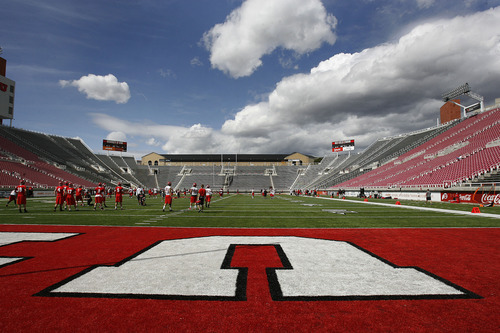This is an archived article that was published on sltrib.com in 2012, and information in the article may be outdated. It is provided only for personal research purposes and may not be reprinted.
After they destroyed Pittsburgh in the Fiesta Bowl, the Utah Utes of 2004 deserved to keep playing in search of greater rewards. So did the '08 Utes, who emerged from a Sugar Bowl upset of Alabama as the only unbeaten team in major college football.
Too bad those teams would not have made the playoffs, if they existed then.
The stories of the '04 and '08 Utes illustrate why a playoff system is necessary — and so is a selection committee to determine the field. The ongoing discussions that almost certainly will result in a playoff format being adopted this summer, effective for the 2014 season, steer me to these conclusions, looking backward and forward:
Utah's unbeaten teams of this century would not have made the four-team playoffs, via any combination of polls and computers. Each year, the Utes stood sixth in the final BCS standings, using such methods.
And membership in the Pac-12 now exempts the Utes from worrying about inclusion issues. They're part of college football's power structure.
"Luckily, we're on board at the right time," Ute athletic director Chris Hill said recently. "Our timing couldn't be better."
BYU's playoff access as an independent is more uncertain, and so is the issue of where the school fits into a potential world of megaconferences. For now, the Utes and Cougars share this historical distinction: BYU's 1984 national championship and Utah's lack of access to a title game in '04 or '08 are viewed equally as flaws in the old systems.
I'll always contend that the BCS treated the Utes very well, at that stage of their program's emergence. They otherwise never would have enjoyed such opportunities to perform, and they took advantage of them.
Regardless, the Utes now are positioned for much more. Here's how the playoffs should look, with or without them:
• Only conference champions should be eligible. That preserves the regular season's value and distinguishes college football from the NFL. True, Alabama was the best team in the country last season and would have been left out in my proposal. Then again, the supposed biggest game of the season, LSU's victory at Alabama in November, became meaningless.
• The field should be decided by a selection committee, just as in basketball (and lower levels of college football), making polls irrelevant. Coaches, with obvious self-interest, should not influence which teams play for the championship.
• The playoffs should help preserve the traditional bowl structure, in terms of the semifinals. If a Pac-12 or Big Ten school is a No. 1 or 2 seed, for instance, the Rose Bowl would host the game. The national championship game venue should be designated in advance, chosen by bidding just like basketball's Final Four site.
The playoffs are coming, and this stuff seems revolutionary only because it took so long. My favorite overreaction came from former Utah coach Urban Meyer, who said if his Ohio State team is in the semifinals, he'll have his coaching staff spend equal time preparing for potential championship game matchups.
Whoa. NFL teams manage to get ready for one opponent at a time, so the Buckeyes probably could do the same.
Then there's the widespread response to the SEC/Big 12 announcement of a new bowl game matching its champions. Observers are saying this means the leagues are taking over college football, with megaconferences soon to follow. Actually, those leagues intend to send their best teams to the playoffs, not into that bowl game, so what's the big deal?
In any case, this obviously is a new world for college football. BYU's next five years will be very intriguing, regarding what the Cougars try to do to remain relevant. Utah, in contrast, is secure. The Utes are right where they want to be, other than needing to improve their .444 winning percentage in Pac-12 history.
Twitter: @tribkurt





